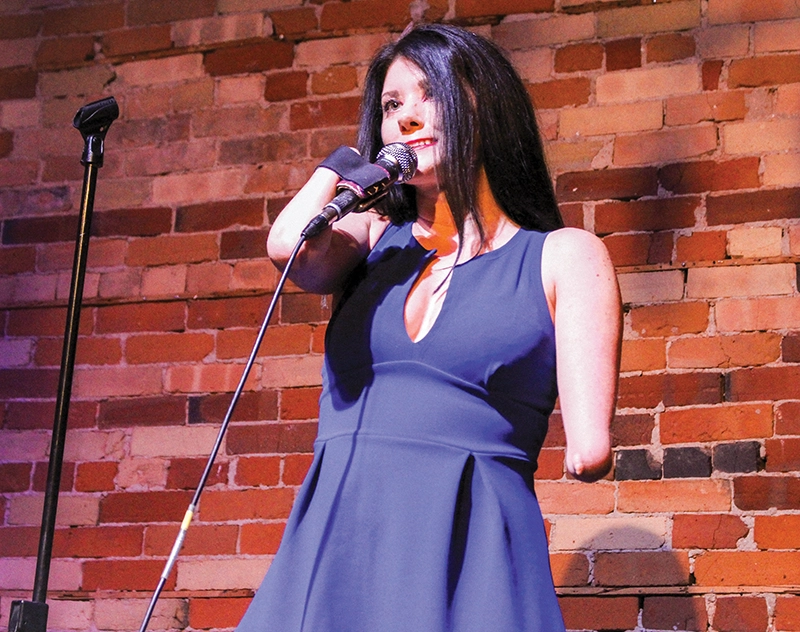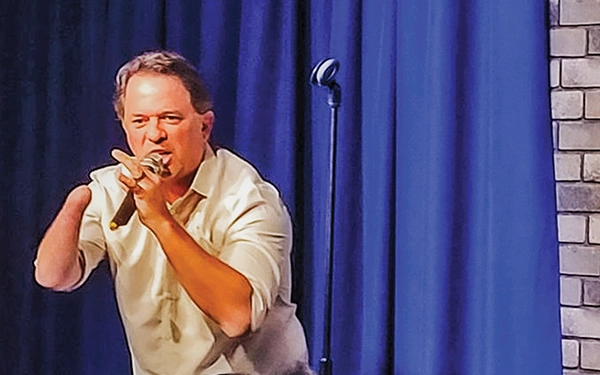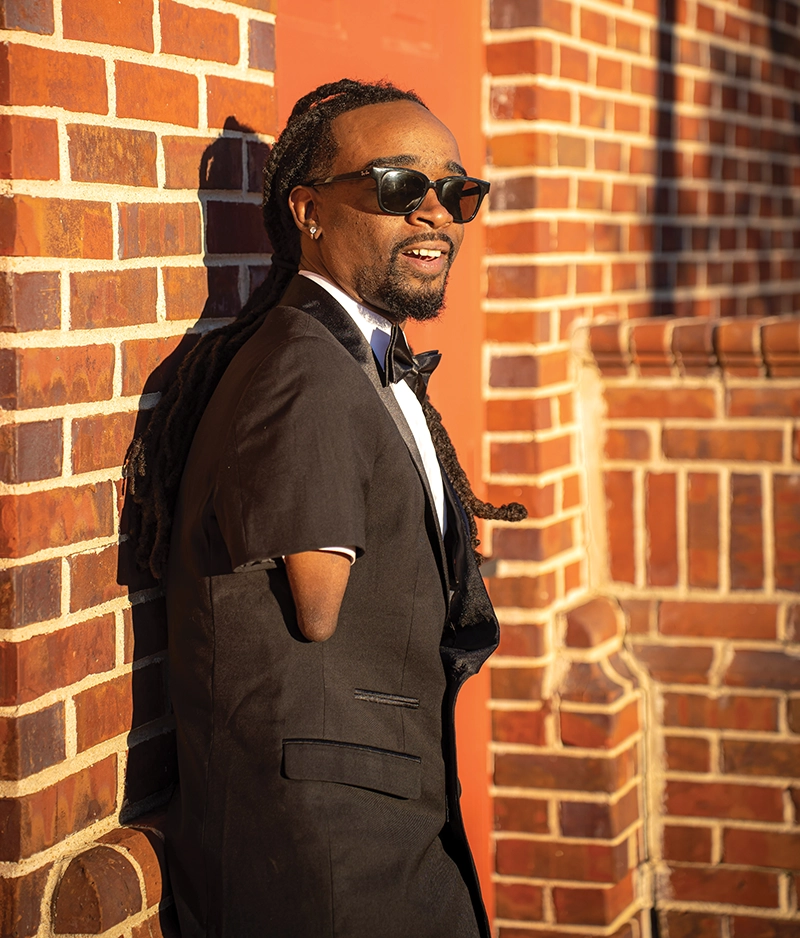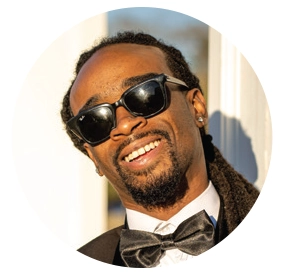These amputee comedians make audiences howl. They also get people to think seriously about disability.
By Rene Agredano
Most of us would rather have a root canal than tell jokes to a crowd. But Courtney Gilmour has never been like most of us. A rising star on the stand-up comedy circuit, Gilmour makes people laugh while rewriting narratives about the amputee experience in an able-bodied world.

Courtney Gilmour. Courtesy Courtney Gilmour.
“Describing my daily encounters with strangers, with children, with cab drivers, with people who just come into contact with me, that’s a really great way to show people ‘Hey, this is how not to talk to me!’” says Gilmour, a 38-year-old Canadian whose career is starting to take off. Her debut record, Let Me Hold Your Baby, got a Best Comedy Album nomination at this year’s Juno Awards (Canada’s equivalent to the Grammys). Gilmour also recently made the finals of Canada’s Got Talent. Now she’s on a trajectory to light up North American comedy clubs, spinning amusing tales of life as a single woman who just happens to be a congenital bilateral arm amputee.
Like all great comics, Gilmour excels at turning ordinary situations into funny, relatable food for thought. Her romantic life is a crowd favorite. “If my boyfriend goes away for the weekend,” she asks in one riff, “it’s like, ‘Do I really miss the love of my life? Or do I just miss that peanut butter on the top shelf?’” But Gilmour doesn’t only share these everyday scenes of life with limb difference to get laughs out of a crowd. Her punchy banter is also an opportunity to create a long-lasting, positive impact on spectators. Although raising awareness about disability isn’t the goal of any given performance, it’s a nice bonus. “I think that’s a really great byproduct of my humor,” she says.
Most of Gilmour’s current dating-scene vignettes are safe for broadcast TV, but her early material was considered edgy enough to land her on the bill at X-rated comedy festivals. “People liked it, but I was just talking about going on dates and having sex,” she laughs. The reactions taught Gilmour that the romantic lives of people with disabilities are still viewed as a novelty by able-bodied audience members. “It’s still a bit of a foreign concept to think of amputees as sexual beings who have healthy relationships and go on normal dates,” she notes. “It gave me a good metric of where people are at in terms of how they perceive me as a young woman in the world.”
Correcting misconceptions about amputees is an exhausting job that most people with limb loss would rather not (and should not have to) tackle. But for someone like Gilmour, who was born with a quick wit and a knack for pinpointing life’s absurdities, humor can be a form of empowerment. Laughter can put people at ease while forcing them to consider their own unexamined, sometimes uncomfortable prejudices about people with disabilities. As Gilmour builds her repertoire of material, she continues to see that even the most ordinary situations are comedic fodder that can get a crowd laughing and thinking. From getting change at the grocery store to swiping left or right on the Tinder app, jokes are her favorite way to influence how people perceive and think about amputees.
“People will make those connections with disability and see me as a representation of like, ‘Oh! She’s not just a one-dimensional person who doesn’t have romantic relationships, doesn’t have a life, or lives alone with a cat!’” she says.
Gilmour’s work gives a voice to amputees who may not want to stand out on a stage. As a congenital amputee, she has never known life as a four-limbed person. But she frequently receives emails from people who are about to lose a limb or recently had one amputated. Many write to thank her for the positive influence her work has on their life, and some add questions about how she navigates the world as an amputee. Gilmour is glad she can be there for someone about to experience limb loss, even though she has never experienced amputation surgery herself. “I can only imagine how scary that is,” she says. “It’s not something I can relate to, but I can help with tips on what life can look like for them after limb loss.”
Laughter, Before and After
New York comedian Mike Dillon knows what it’s like to stand in the spotlight before and after limb loss. A 20-year veteran of the New York comedy club circuit, the entertainer and producer lost his lower right leg in 2014 to diabetes-related complications. The ups and downs of recovery were enough to nudge him off the stage, but he has stayed active in the industry as the owner of Gateway Comedy in Long Island. “Tragedy can’t remain tragedy,” he says. “Eventually there has to be some kind of laughter.”

Performing is as therapeutic for the comic as it is for the audience, Dillon explains: “There is that thing that you get out of making people laugh.” He has incorporated that experience into his emotional and physical healing process by mentoring new comics, performing in his wheelchair, and planning shows from his hospital bed. Every good joke can be a positive influence in a chaotic world, he believes—and researchers from the Centre for Comedy Studies Research at Brunel University in London agree. In a 2015 study, they suggested that “stand-up comedy provides disabled comedians with the opportunity to fully participate in public communication and elicit a sense of control over the audience.” A punchline delivered by a comic with a disability is “potentially a powerful tool through which hegemonic norms around disability can be challenged and renegotiated.” Comedians like Gilmour and Dillon see these benefits can positively impact both the artist and the audience at every performance.
“It’s a rush, seeing people laugh and maybe getting a little break from life,” says Dillon. “You’re doing something good for the betterment of the people who show up.” That sense of giving back is what drives many comics to keep going despite the occasional tough crowd, the late-night shows, and the weeks spent on tour away from family.
“Comedy is hard,” says Mike Bolland, a 58-year-old congenital hand amputee from Mesa, Arizona. “It doesn’t matter if you have two hands, one hand, no legs, whatever it is. If you fail up there, it can be brutal.” But Bolland’s comedy side hustle has been rewarding enough to keep him involved. “There’s something addicting about it,” he says. “I mean, there’s a little bit of self-gratification when you do make people laugh. But I think I’m actually accomplishing something more than just telling jokes. I think I am helping the community by having the audience look at someone like me in a way of acceptance.”
From the time he was a kid, Bolland took a playful approach to addressing the ever-present elephant in the room: his missing hand. “It’s much easier to gain acceptance if you are lighthearted about it and are able to joke about it,” he explains. Instead of shirking from the obvious, he loves hitting it head-on with a punchline. In one bit from his stage act, he quips: “I have nothing negative to say about having one hand, I really don’t. Except maybe my lack of juggling ability, and I don’t like buffets.” Later he assures the audience, “If anybody spills anything tonight, I’ve got your back,” while stuffing a roll of paper towels over his wrist. If he ever catches any flack from the crowd, he waves his arm around and says: “I’m actually flipping you off, you just don’t know that.”
Bolland came to the comedy scene relatively late in life, after retiring from his career as a marketing executive. But the spotlight has always felt familiar. When he was eight years old, he was cast as Danny in the 1974 movie The Trial of Billy Jack. His role as a one-handed guitar-playing boy was the last of his acting career. But in his 20s, after several years of success in amateur bowling competitions, Bolland became the first person born without a hand to compete in a Professional Bowlers Association event. He then spent about 30 years in the business world before a life-changing cancer diagnosis propelled him back to his entertainment roots.
“I always wanted to try comedy,” he says. “After the cancer it was like, ‘If you’re going to do it, give it a shot now.’” Shortly after completing his treatment, Bolland enrolled in comedy classes at a local club, signed up for open mic nights, and reconnected with his ability to work a crowd. Like many comedians, he mines his audience for ad-lib material. For instance, if Bolland spies a bearded man near the stage, he might crack: “Hey, Jesus—if you’re pulling miracles, I can use some fingers.” Not all his jokes land as well as that one does, and he’s bombed once or twice. It comes with the territory. Even so, five years after his first time on stage, Bolland’s hooked. When he’s not running his Helping Hands Foundation, which provides prostheses to Arizona residents, his sights are set on touring, motivational speaking appearances, and his ultimate aspiration: a five-minute segment on Jimmy Kimmel Live.
“I really hope that when the audience sees me, hopefully some of the walls have been broken,” Bolland says. “And if they see someone else like me, I hope they approach them in a positive way based on the interaction and what they saw out of me.” But as long as they laugh, Bolland will get the personal payoff he seeks.
“I think everyone has their own coping mechanisms,” he says. “Mine happens to be comedy. I like to laugh, and that’s the way I do things. Whether it’s for everyone, I don’t know. But I certainly know that for me, it helps.”
Acting Naturally
Unlike Bolland, who waited until late in life to cultivate his comic persona, entertainer Tre NuBB has been able to showcase his natural talents from a very early age. A congenital triple amputee (he was born without both arms and one leg), NuBB says his supportive, spiritual family and strong friendships encouraged him to nurture his showmanship almost from the time he could talk. “I’ve always been outgoing, never been afraid to be me,” he says. With a brilliant smile and calm demeanor, NuBB radiates a warm, welcoming energy that’s easy to be around. He’s never shied away from people’s curiosity about his limb difference because he understands that it’s simply human nature.

Tre NuBB. Courtesy Tre NuBB.
“I was the kid with no arms and one leg, so all the other kids were curious,” he says. “I would do little things in P.E. (class), like I’d shoot a basketball, and all the kids would go crazy!”
As he matured, the Texas native discovered that levity was an effective way to educate and enlighten people about his everyday life. “I’ve always been a show-you-better-than-I-can-tell-you kind of guy,” he explains. And social media provided the perfect means for showing. NuBB began making short videos that offered glimpses into his daily life—shooting hoops, going out on the town, hanging with friends. Occasionally he’d post a reel that featured him playing the drums, rapping, dancing, or breaking off comedic riffs. Viewers responded with follows, likes, and loves, driving advertiser revenue to his channels.
NuBB started to seriously think about turning his hobby into a career in 2014, when a video collaboration with a prominent local dancer sent him skyrocketing to TikTok fame. “I started getting paid for social media, and it was like, ‘I can really make a living off of this?’” he says. “I went to sleep, woke up, and I had like 13 million views. It blew my mind.”
Even during the pandemic, NuBB didn’t skip a beat. “I was on fire back then,” he recalls. He began building a catalog of material with friends and hired actors to help him promote messages of understanding, ease, and acceptance—welcome sentiments during the anxious days of COVID. Today, his two million-plus social media fans enthusiastically respond to his daily tell-it-like-it-is observations on empathy, belief, and gratitude. NuBB has built a career out of turning the tables on perceptions about disability, and he remains focused on taking his motivational entertainment to larger audiences.
“I want to be that bridge between people without physical disability and with physical disability, to understand that we’re all disabled,” he says. “But let’s try to understand each other. You can do anything that you want to do, as long as you take it serious and believe in yourself.”
SOCIALLY SPEAKING

Courtney Gilmour
courtneygilmour.com
Instagram: @courtneyjgilmour
TikTok: @courtneyjgilmour
YouTube: @courtneygilmour

Tre NuBB
Instagram: @trenubb
TikTok: @TreNubb23
YouTube: @TreNuBB

Mike Bolland
mikebolland.com
Instagram: @mike.bolland
TikTok: @mikebolland
YouTube: @officialmikebolland





